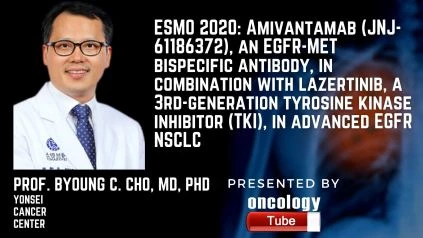Prof. Byoung Chul Cho, MD, Ph.D. Yonsei Cancer Center, Yonsei University College of Medicine discusses the ESMO 2020 Abstract – Amivantamab (JNJ-61186372), an EGFR-MET bispecific antibody, in combination with lazertinib, a 3rd-generation tyrosine kinase inhibitor (TKI), in advanced EGFR NSCLC.
Abstract 1258O
Context
The combination of amivantamab (EGFR-MET bispecific antibody) with lazertinib indicates synergistic inhibition of tumor growth in preclinical studies. In phase 1 CHRYSALIS research (NCT02609776), we present the safety and early efficacy findings of patients receiving amivantamab in combination with lazertinib.
Methodology
Patients with non-small cell lung cancer ( NSCLC) with EGFR Exon 19 deletion or L858R mutation were enrolled in this 2-part research. In order to assess the recommended phase 2 combination dose (RP2CD), Part 1 enrolled patients without previous therapy restriction to test the escalating dose cohorts of amivantamab (700-1050 mg, iv once weekly for 28 days; biweekly thereafter) in combination with standard lazertinib monotherapy (240 mg orally daily). The ongoing Part 2 dose expansion Cohort E tests tentative efficacy in patients progressing on osimertinib without biomarker selection. The investigator’s response was evaluated according to RECIST v1.1.
Outcomes
The combination was received by 71 patients as of 17 March 2020: the median age was 61 y (36-79) and the median prior lines were 1 (0-9). In Part 1, the maximum doses assessed for RP2CD were 1050 mg (1400 mg, ⇠80 kg) of amivantamab + 240 mg of lazertinib. Rash (78 percent), infusion-related response (61 percent), paronychia (42 percent), stomatitis (31 percent), pruritus (24 percent), and diarrhea (14 percent) are included in the interim safety profile. The majority of treatment-related AEs were grade 1-2, with 7 percent of grade 3 identified. As of 30 April 2020, the overall response rate (ORR) was 43.5 percent (95 percent CI, 23.2–65.5) with 10 partial responses (PRs) and 9 patients with stable disease (SD) in 23 Part 1, patients with observable disease; the median period of care was 8.2 months (0.5–10.7) with 13 patients still ongoing. Early antitumor activity has been observed in 14/20 response-assessed patients with 1 complete response, 7 PRs (2 awaiting confirmation), and 6 SD with tumor shrinkage in the post-osimertinib expansion cohort E.
Findings
At their respective full monotherapy doses, amivantamab and lazertinib can be safely combined. In osimertinib-relapsed disease, promising preliminary behavior was observed: updated data will be provided.
Identification of Clinical Trial
NCT02609776; presented on 18 November 2015.

